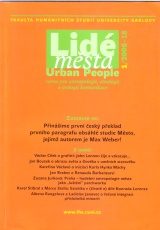Praha
Hudební antropologie města jako „luštění“ patchworku
DOI:
https://doi.org/10.14712/12128112.3840Abstrakt
Most western (and not only western) concepts of music lie on a spectrum delimited by poles, with working title “harmonical pythagoreism” on one side, and semiotic concept on the other. Within the harmonical pythagoreism concept, that is a markedly close parallel to Chinese Confucianism, the “correct“ music is understood as an image of macrocosm; it is governed by the same rules and thus it is an objective reality; in its essence it is close to natural sciences. Just as a note, it must be said that the concept of harmonical pythagoreism is in its pure essence, in today’s western understanding on music, totally marginal. Semiotic concept considers music as pre-arranged system of symbols, whose essence is similar to that of language: To understand musical message, one must learn the “dictionary“ of these symbols including their grammatical and syntactic rules that may be learned by formal analysis of musical expression. Either of these concepts – and of course also every other concept situated on their connecting line – considers music to be in principal a sound phenomenon on one hand and a sui generis phenomenon on the other, governed by own laws. Research methods of such autonomous phenomenon are naturally based on musical analysis. However, ethnomusicologists have realized when researching musical cultures worldwide that the above western musical concept as a primarily sui generis sound phenomenon is neither the only imaginable one nor the only one in existence. Markedly different is, for example, the Sub-Saharan-African musical concept; this difference is also reflected in native terminology…
Stahování
Publikováno
Jak citovat
Číslo
Sekce
Licence

Tato práce je licencována pod Mezinárodní licencí Creative Commons Attribution-NonCommercial-NoDerivatives 4.0.


